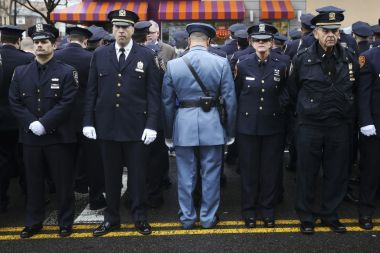Hundreds of police turn backs on NYC mayor during slain officer's funeral

New York City police turned out in their thousands on Sunday for the funeral of the second of two officers murdered last month, but in a sign of persistent tensions with Mayor Bill de Blasio, hundreds turned their backs when he delivered his eulogy.
Politicians, police leaders and other mourners joined family members inside a Brooklyn funeral home to honour Wenjian Liu, who was killed in an ambush that led to accusations the mayor had contributed to an anti-police climate.
Outside, the throng of officers gathered to pay their respects to Liu stretched for nearly a mile along an avenue in the borough's Bensonhurst neighbourhood. When de Blasio began his speech, hundreds of them turned their backs to screens showing his image, despite earlier entreaties by City Police Commissioner Bill Bratton to mourners to show restraint.
The back-turning gesture has become symbolic of the anger many officers feel for de Blasio over what they see as his failure to support them during a wave of anti-police protests.
De Blasio used the eulogy to call for reconciliation and after a wrenching year for the city.
"New York has been from its earliest days a most tolerant of cities ... but there have always been times when that harmony has been challenged," de Blasio said at Liu's funeral, one of the largest in NYPD history.
"Let us rededicate ourselves to those great New York traditions of mutual understanding and living in harmony."
Liu, 32, and Rafael Ramos, 40, were ambushed and fatally shot on Dec. 20 by a killer who said he wanted to avenge the deaths of two unarmed black men this summer in encounters with white officers in Ferguson, Missouri, and New York City.
Those deaths, and decisions by grand juries in November and December to return no charges against the police officers involved, triggered weeks of protests around the country against police treatment of African Americans and other minorities.
The crowd that turned out to honour Liu, believed to be the New York Police Department's first Chinese-American officer killed in the line of duty, appeared nearly equal to the estimated 25,000 who came to Ramos' funeral.
Liu's wife paid a tearful tribute to the officer as a devoted husband and son. "Wenjian is my hero," said Pei Xia Chen. "We can always count on him."
Later, as pall bearers carried the casket draped in the NYPD flag to the hearse, helicopters flew at low altitude over mourners in a manoeuvre known as a "missing man formation," an NYPD tradition.
SILENT PROTESTS AGAINST THE MAYOR
To be sure, a majority of the officers outside the funeral home faced toward de Blasio when he spoke, especially in the front ranks. But further down the avenue, hundreds were seen turning away, much like at last week's services for Ramos.
After the ceremony, Patrick Lynch, the head of the largest police union, said officers were going through a difficult, emotional time.
"They feel that City Hall has turned their back on them and they have a right to have their opinion heard and they did it respectfully in the street, not inside the church," said Lynch.
The union leader had said immediately after the ambush on Liu and Ramos that the mayor had contributed to the political climate that led to their deaths.
De Blasio offered qualified support for protesters after the grand jury decision not to charge the officer involved in the chokehold death of Eric Garner in New York. The mayor said he had talked to his bi-racial son, Dante, about being wary in dealing with police.
Relations between the police and de Blasio had begun to fray before that. During his 2013 campaign for office, the mayor criticized some NYPD tactics, including a "stop-and-frisk" policy that critics said was used to harass African-Americans and other minority groups.
Many of the tens of thousands of mourners crowded along the sidewalk outside Sunday's services were Asian.
Caiyao Chen, 32, who emigrated from China in 2000, said he didn't know the slain officer but he said he was particularly saddened because Liu was his parents' only son.
"In Chinese tradition, the son carries the blood of the family," he said. "The family is broken now."











